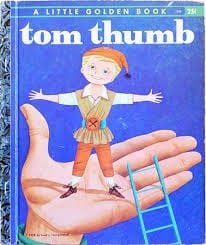
Once upon a time there lived a wood-cutter and his wife, who had seven children, all boys. The eldest was only ten years old, and the youngest was seven. People were astonished that the wood-cutter had had so many children in so short a time, but the reason was that his wife delighted in children, and never had less than two at a time.
They were very poor, and their seven children were a great tax on them, for none of them was yet able to earn his own living. And they were troubled also because the youngest was very delicate and could not speak a word. They mistook for stupidity what was in reality a mark of good sense.
This youngest boy was very little. At his birth he was scarcely bigger than a man’s thumb, and he was called in consequence ‘Little Tom Thumb.’ The poor child was the scapegoat of the family, and got the blame for everything. All the same, he was the sharpest and shrewdest of the brothers, and if he spoke but little he listened much.
There came a very bad year, when the famine was so great that these poor people resolved to get rid of their family. One evening, after the children had gone to bed, the wood-cutter was sitting in the chimney-corner with his wife. His heart was heavy with sorrow as he said to her:
‘It must be plain enough to you that we can no longer feed our children. I cannot see them die of hunger before my eyes, and I have made up my mind to take them to-morrow to the forest and lose them there. It will be easy enough to manage, for while they are amusing themselves by collecting faggots we have only to disappear without their seeing us.’
‘Ah!’ cried the wood-cutter’s wife, ‘do you mean to say you are capable of letting your own children be lost?’
In vain did her husband remind her of their terrible poverty; she could not agree. She was poor, but she was their mother. In the end, however, reflecting what a grief it would be to see them die of hunger, she consented to the plan, and went weeping to bed.
Little Tom Thumb had heard all that was said. Having discovered, when in bed, that serious talk was going on, he had got up softly, and had slipped under his father’s stool in order to listen without being seen. He went back to bed, but did not sleep a wink for the rest of the night, thinking over what he had better do. In the morning he rose very early and went to the edge of a brook. There he filled his pockets with little white pebbles and came quickly home again.
They all set out, and little Tom Thumb said not a word to his brothers of what he knew.
They went into a forest which was so dense that when only ten paces apart they could not see each other. The wood-cutter set about his work, and the children began to collect twigs to make faggots. Presently the father and mother, seeing them busy at their task, edged gradually away, and then hurried off in haste along a little narrow footpath.
When the children found they were alone they began to cry and call out with all their might. Little Tom Thumb let them cry, being confident that they would get back home again. For on the way he had dropped the little white stones which he carried in his pocket all along the path.
‘Don’t be afraid, brothers,’ he said presently; ‘our parents have left us here, but I will take you home again. Just follow me.’
They fell in behind him, and he led them straight to their house by the same path which they had taken to the forest. At first they dared not go in, but placed themselves against the door, where they could hear everything their father and mother were saying.
Now the wood-cutter and his wife had no sooner reached home than the lord of the manor sent them a sum of ten crowns which had been owing from him for a long time, and of which they had given up hope. This put new life into them, for the poor creatures were dying of hunger.
The wood-cutter sent his wife off to the butcher at once, and as it was such a long time since they had had anything to eat, she bought three times as much meat as a supper for two required.
When they found themselves once more at table, the wood-cutter’s wife began to lament.
‘Alas! where are our poor children now?’ she said; ‘they could make a good meal off what we have over. Mind you, William, it was you who wished to lose them: I declared over and over again that we should repent it. What are they doing now in that forest? Merciful heavens, perhaps the wolves have already eaten them! A monster you must be to lose your children in this way!’
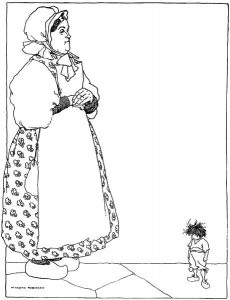
‘A good dame opened the door‘
At last the wood-cutter lost patience, for she repeated more than twenty times that he would repent it, and that she had told him so. He threatened to beat her if she did not hold her tongue.
It was not that the wood-cutter was less grieved than his wife, but she browbeat him, and he was of the same opinion as many other people, who like a woman to have the knack of saying the right thing, but not the trick of being always in the right.
‘Alas!’ cried the wood-cutter’s wife, bursting into tears, ‘where are now my children, my poor children?’
She said it once so loud that the children at the door heard it plainly. Together they all called out:
‘Here we are! Here we are!’
She rushed to open the door for them, and exclaimed, as she embraced them:
‘How glad I am to see you again, dear children! You must be very tired and very hungry. And you, Peterkin, how muddy you are—come and let me wash you!’
This Peterkin was her eldest son. She loved him more than all the others because he was inclined to be red-headed, and she herself was rather red.
They sat down at the table and ate with an appetite which it did their parents good to see. They all talked at once, as they recounted the fears they had felt in the forest.
The good souls were delighted to have their children with them again, and the pleasure continued as long as the ten crowns lasted. But when the money was all spent they relapsed into their former sadness. They again resolved to lose the children, and to lead them much further away than they had done the first time, so as to do the job thoroughly. But though they were careful not to speak openly about it, their conversation did not escape little Tom Thumb, who made up his mind to get out of the situation as he had done on the former occasion.
But though he got up early to go and collect his little stones, he found the door of the house doubly locked, and he could not carry out his plan.
He could not think what to do until the wood-cutter’s wife gave them each a piece of bread for breakfast. Then it occurred to him to use the bread in place of the stones, by throwing crumbs along the path which they took, and he tucked it tight in his pocket.
Their parents led them into the thickest and darkest part of the forest, and as soon as they were there slipped away by a side-path and left them. This did not much trouble little Tom Thumb, for he believed he could easily find the way back by means of the bread which he had scattered wherever he walked. But to his dismay he could not discover a single crumb. The birds had come along and eaten it all.
They were in sore trouble now, for with every step they strayed further, and became more and more entangled in the forest. Night came on and a terrific wind arose, which filled them with dreadful alarm. On every side they seemed to hear nothing but the howling of wolves which were coming to eat them up. They dared not speak or move.
In addition it began to rain so heavily that they were soaked to the skin. At every step they tripped and fell on the wet ground, getting up again covered with mud, not knowing what to do with their hands.
Little Tom Thumb climbed to the top of a tree, in an endeavour to see something. Looking all about him he espied, far away on the other side of the forest, a little light like that of a candle. He got down from the tree, and was terribly disappointed to find that when he was on the ground he could see nothing at all.
After they had walked some distance in the direction of the light, however, he caught a glimpse of it again as they were nearing the edge of the forest. At last they reached the house where the light was burning, but not without much anxiety, for every time they had to go down into a hollow they lost sight of it.
They knocked at the door, and a good dame opened to them. She asked them what they wanted.
Little Tom Thumb explained that they were poor children who had lost their way in the forest, and begged her, for pity’s sake, to give them a night’s lodging.
Noticing what bonny children they all were, the woman began to cry.
‘Alas, my poor little dears!’ she said; ‘you do not know the place you have come to! Have you not heard that this is the house of an ogre who eats little children?’
‘Alas, madam!’ answered little Tom Thumb, trembling like all the rest of his brothers, ‘what shall we do? One thing is very certain: if you do not take us in, the wolves of the forest will devour us this very night, and that being so we should prefer to be eaten by your husband. Perhaps he may take pity on us, if you will plead for us.’
The ogre’s wife, thinking she might be able to hide them from her husband till the next morning, allowed them to come in, and put them to warm near a huge fire, where a whole sheep was cooking on the spit for the ogre’s supper.
Just as they were beginning to get warm they heard two or three great bangs at the door. The ogre had returned. His wife hid them quickly under the bed and ran to open the door.
The first thing the ogre did was to ask whether supper was ready and the wine opened. Then without ado he sat down to table. Blood was still dripping from the sheep, but it seemed all the better to him for that. He sniffed to right and left, declaring that he could smell fresh flesh.
‘Indeed!’ said his wife. ‘It must be the calf which I have just dressed that you smell.’
‘I smell fresh flesh, I tell you,’ shouted the ogre, eyeing his wife askance; ‘and there is something going on here which I do not understand.’
With these words he got up from the table and went straight to the bed.
‘Aha!’ said he; ‘so this is the way you deceive me, wicked woman that you are! I have a very great mind to eat you too! It’s lucky for you that you are old and tough! I am expecting three ogre friends of mine to pay me a visit in the next few days, and here is a tasty dish which will just come in nicely for them!’
One after another he dragged the children out from under the bed.
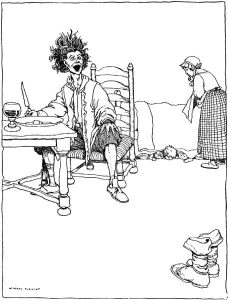
‘He could smell fresh flesh’
The poor things threw themselves on their knees, imploring mercy; but they had to deal with the most cruel of all ogres. Far from pitying them, he was already devouring them with his eyes, and repeating to his wife that when cooked with a good sauce they would make most dainty morsels.
Off he went to get a large knife, which he sharpened, as he drew near the poor children, on a long stone in his left hand.
He had already seized one of them when his wife called out to him. ‘What do you want to do it now for?’ she said; ‘will it not be time enough to-morrow?’
‘Hold your tongue,’ replied the ogre; ‘they will be all the more tender.’
‘But you have such a lot of meat,’ rejoined his wife; ‘look, there are a calf, two sheep, and half a pig.’
‘You are right,’ said the ogre; ‘give them a good supper to fatten them up, and take them to bed.’
The good woman was overjoyed and brought them a splendid supper; but the poor little wretches were so cowed with fright that they could not eat.
As for the ogre, he went back to his drinking, very pleased to have such good entertainment for his friends. He drank a dozen cups more than usual, and was obliged to go off to bed early, for the wine had gone somewhat to his head.
Now the ogre had seven daughters who as yet were only children. These little ogresses all had the most lovely complexions, for, like their father, they ate fresh meat. But they had little round grey eyes, crooked noses, and very large mouths, with long and exceedingly sharp teeth, set far apart. They were not so very wicked at present, but they showed great promise, for already they were in the habit of killing little children to suck their blood.
They had gone to bed early, and were all seven in a great bed, each with a crown of gold upon her head.
In the same room there was another bed, equally large. Into this the ogre’s wife put the seven little boys, and then went to sleep herself beside her husband.
Little Tom Thumb was fearful lest the ogre should suddenly regret that he had not cut the throats of himself and his brothers the evening before. Having noticed that the ogre’s daughters all had golden crowns upon their heads, he got up in the middle of the night and softly placed his own cap and those of his brothers on their heads. Before doing so, he carefully removed the crowns of gold, putting them on his own and his brothers’ heads. In this way, if the ogre were to feel like slaughtering them that night he would mistake the girls for the boys, and vice versa.
Things fell out just as he had anticipated. The ogre, waking up at midnight, regretted that he had postponed till the morrow what he could have done overnight. Jumping briskly out of bed, he seized his knife, crying: ‘Now then, let’s see how the little rascals are; we won’t make the same mistake twice!’
He groped his way up to his daughters’ room, and approached the bed in which were the seven little boys. All were sleeping, with the exception of little Tom Thumb, who was numb with fear when he felt the ogre’s hand, as it touched the head of each brother in turn, reach his own.
‘Upon my word,’ said the ogre, as he felt the golden crowns; ‘a nice job I was going to make of it! It is very evident that I drank a little too much last night!’
Forthwith he went to the bed where his daughters were, and here he felt the little boys’ caps.
‘Aha, here are the little scamps!’ he cried; ‘now for a smart bit of work!’
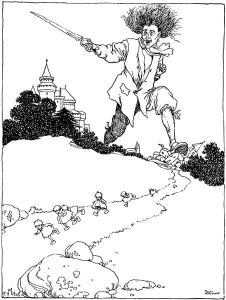
‘He set off over the countryside’
With these words, and without a moment’s hesitation, he cut the throats of his seven daughters, and well satisfied with his work went back to bed beside his wife.
No sooner did little Tom Thumb hear him snoring than he woke up his brothers, bidding them dress quickly and follow him. They crept quietly down to the garden, and jumped from the wall. All through the night they ran in haste and terror, without the least idea of where they were going.
When the ogre woke up he said to his wife:
‘Go upstairs and dress those little rascals who were here last night.’
The ogre’s wife was astonished at her husband’s kindness, never doubting that he meant her to go and put on their clothes. She went upstairs, and was horrified to discover her seven daughters bathed in blood, with their throats cut.
She fell at once into a swoon, which is the way of most women in similar circumstances.
The ogre, thinking his wife was very long in carrying out his orders, went up to help her, and was no less astounded than his wife at the terrible spectacle which confronted him.
‘What’s this I have done?’ he exclaimed. ‘I will be revenged on the wretches, and quickly, too!’
He threw a jugful of water over his wife’s face, and having brought her round ordered her to fetch his seven-league boots, so that he might overtake the children.
He set off over the countryside, and strode far and wide until he came to the road along which the poor children were travelling. They were not more than a few yards from their home when they saw the ogre striding from hill-top to hill-top, and stepping over rivers as though they were merely tiny streams.
Little Tom Thumb espied near at hand a cave in some rocks. In this he hid his brothers, and himself followed them in, while continuing to keep a watchful eye upon the movements of the ogre.
Now the ogre was feeling very tired after so much fruitless marching (for seven-league boots are very fatiguing to their wearer), and felt like taking a little rest. As it happened, he went and sat down on the very rock beneath which the little boys were hiding. Overcome with weariness, he had not sat there long before he fell asleep and began to snore so terribly that the poor children were as frightened as when he had held his great knife to their throats.
Little Tom Thumb was not so alarmed. He told his brothers to flee at once to their home while the ogre was still sleeping soundly, and not to worry about him. They took his advice and ran quickly home.
Little Tom Thumb now approached the ogre and gently pulled off his boots, which he at once donned himself. The boots were very heavy and very large, but being enchanted boots they had the faculty of growing larger or smaller according to the leg they had to suit. Consequently they always fitted as though they had been made for the wearer.
He went straight to the ogre’s house, where he found the ogre’s wife weeping over her murdered daughters.
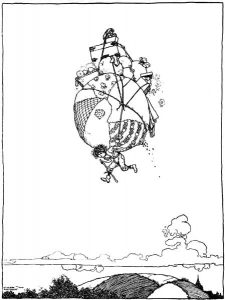
‘Your husband,’ said little Tom Thumb, ‘is in great danger, for he has been captured by a gang of thieves, and the latter have sworn to kill him if he does not hand over all his gold and silver. Just as they had the dagger at his throat, he caught sight of me and begged me to come to you and thus rescue him from his terrible plight. You are to give me everything of value which he possesses, without keeping back a thing, otherwise he will be slain without mercy. As the matter is urgent he wished me to wear his seven-league boots, to save time, and also to prove to you that I am no impostor.’
The ogre’s wife, in great alarm, gave him immediately all that she had, for although this was an ogre who devoured little children, he was by no means a bad husband.
Little Tom Thumb, laden with all the ogre’s wealth, forthwith repaired to his father’s house, where he was received with great joy.
Many people do not agree about this last adventure, and pretend that little Tom Thumb never committed this theft from the ogre, and only took the seven-league boots, about which he had no compunction, since they were only used by the ogre for catching little children. These folks assert that they are in a position to know, having been guests at the wood-cutter’s cottage. They further say that when little Tom Thumb had put on the ogre’s boots, he went off to the Court, where he knew there was great anxiety concerning the result of a battle which was being fought by an army two hundred leagues away.
They say that he went to the king and undertook, if desired, to bring news of the army before the day was out; and that the king promised him a large sum of money if he could carry out his project.
Little Tom Thumb brought news that very night, and this first errand having brought him into notice, he made as much money as he wished. For not only did the king pay him handsomely to carry orders to the army, but many ladies at the court gave him anything he asked to get them news of their lovers, and this was his greatest source of income. He was occasionally entrusted by wives with letters to their husbands, but they paid him so badly, and this branch of the business brought him in so little, that he did not even bother to reckon what he made from it.
After acting as courier for some time, and amassing great wealth thereby, little Tom Thumb returned to his father’s house, and was there greeted with the greatest joy imaginable. He made all his family comfortable, buying newly-created positions for his father and brothers. In this way he set them all up, not forgetting at the same time to look well after himself.

